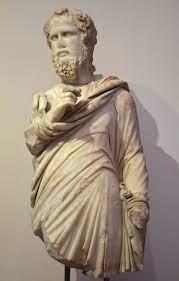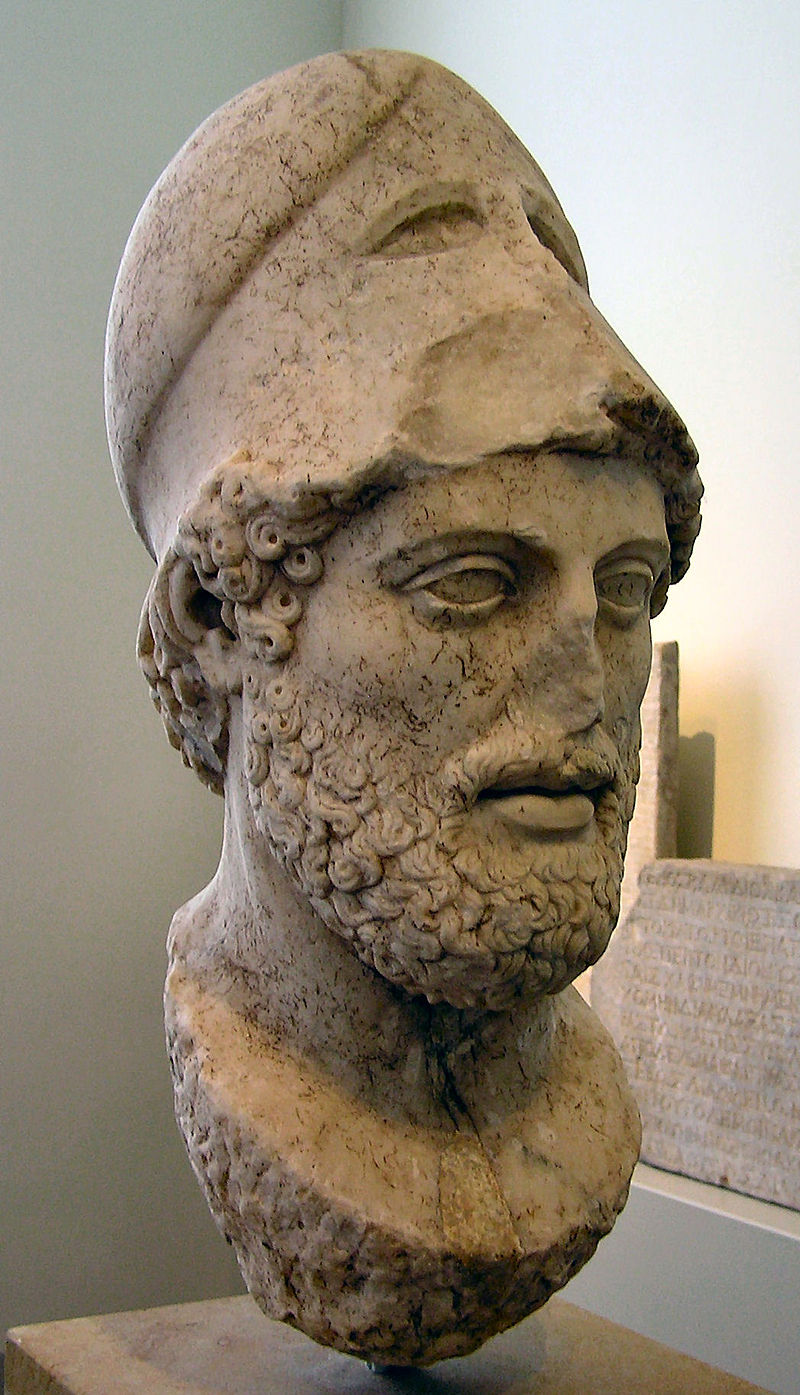1.2 The Opponents of Socrates
LEARNING OBJECTIVES
By the end of this section you will discover:
- Why the 5th century BCE in Athens, the “Age of Pericles,” was a golden age for philosophy and the arts.
- How the Sophists were valued by Athenians in this time.
- Why Socrates disagreed with their “epistemic relativism.”
There were, in Socrates’ day, others who called themselves philosophers. These teachers, known as “sophists,” held that all thought was really just opinion, and the goal of philosophy was to train one to profess and defend one’s opinions in the public sphere. Specializing in rhetoric, the sophists were typically seen more as professional educators than philosophers. The sophists traveled extensively educating people throughout Greece. Unlike philosophical schools, the sophists had no common set of philosophical doctrines that connected them to each other. They did, however, focus on teaching techniques of debate and persuasion which centered around the study of language, semantics, and grammar for use in convincing people of certain viewpoints. They also taught students their own interpretations of the social sciences, mathematics, and history, among others. They flourished as a result of a special need at that time for Greek education. Prominent sophists include Protagoras (490-420 BC) from Abdera in Thrace, Gorgias (487-376 BC) from Leontini in Sicily, Hippias (485-415 BC) from Elis in the Peloponnesos, Prodicus (465-390 BC) from the island of Ceos, and Thrasymachus (459-400 BC) from Chalcedon on the Bosporus.

The fifth century BCE, when Socrates taught, witnessed a golden age in Greece, especially in Athens, where it was known as “The Age of Pericles.” Pericles (495-429 BCE) was the Athenian General famous for his military accomplishments but equally famous for his patronage of new thought, art, and culture. It was an age of Democracy in which freedom of thought and expression triumphed.

However, with this new freedom of thought came the idea that no one’s grasp of the truth was any better than anyone else’s. Historian John Marshall, in his Short History of Greek Philosophy, suggests that whereas in earlier times philosophers attempted to get to the real and the true, the Sophists did not believe there was any real truth at all.
The notion of an ultimately true and real, whatever form it might assume in various theorists’ hands, being in its essence apart from and even antagonistic to the perceptions of sense, was at last definitely cast aside as a delusion; what remained were the individual perceptions, admittedly separate, unreasoned, unrelated; Reason was dethroned, Chaos was king. In other words, what seemed to any individual sentient being at any moment to be, that for him was, and nothing else was. The distinction between the real and the apparent was … abolished, not as before by rejecting the sensually apparent in favor of the rationally conceived real, but by the denial of any such real altogether. (John Marshall, Short History of Greek Philosophy, 1891, Project Gutenberg)
Unlike earlier philosophers who attempted to get to an objective and true understanding of the world, the Sophists were epistemic relativists. They held that because there is no one, objective truth, people can decide for themselves what their truths shall be. (This idea will be echoed 2500 years later in the arguments of the philosopher Friedrich Nietzsche and others).
Among the Sophists, this skepticism is manifested in epistemic and moral relativism. Epistemic relativism is the view that there is no objective standard for evaluating the truth or likely truth of our beliefs. Rather, epistemic standards of reasoning are relative to one’s point of view and interests. Roughly, this is the view that what is true for me might not be true for you (when we are not just talking about ourselves). Epistemic relativism makes no distinction between knowledge, belief, or opinion on the one hand, and truth and reality on the other. To take a rather silly example, if I think it’s Tuesday, then that’s what’s true for me; and if you think it’s Thursday, then that’s what is true for you. In cases like this, epistemic relativism seems quite absurd, yet many of us have grown comfortable with the notion that say, beliefs about the moral acceptability of capital punishment might be true for some people and not for others (Marshall, op.cit.).
Marshall continues,
… The collapse of contending philosophies in Greece promoted the collapse of contending systems of political authority, and the collapse of political authority facilitated the growth of that individualism in thought with which the name of the Sophists is associated. …. Devices of [rhetoric] called ‘commonplaces’ were constructed, whereby, irrespective of the truth or falsehood of the subject matter, a favorable vote in the public assemblies, a successful verdict in the public courts, might more readily be obtained. Thus, by skill of verbal rhetoric, the worse might be made to appear the better reason; and philosophy, so far as it continued its functions, became a search, not for the real amidst the confusions of the seeming and unreal, but a search for the seeming and the plausible, to the detriment, or at least to the ignoring, of any reality at all. The goal of philosophy then was no longer universal truth, but individual success; and consistently enough, the philosopher himself professed the individualism of his own point of view, by teaching only those who were prepared to pay him for his teaching. All over Greece, with the growth of democracy, this philosophy of persuasion became popular; but it was to Athens, under Pericles at this time the center of all that was most vivid and splendid in Greek life and thought, that the chief teachers of the new philosophy flocked from every part of the Greek world. The first great leader of the Sophists was Protagoras. He, it is said, was the first to teach for pay; he also was the first to adopt the name of Sophist. In the word “Sophist” there was indeed latent the idea which subsequently attached to it, but as first used it seems to have implied this only, that skill was the object of the teaching rather than truth; the new teachers professed themselves ‘practical men,’ not mere theorists (Marshall, ibid.).
Although the Sophists styled themselves as men of culture and philosophy, their real aim was politics. They were the “spin doctors” of their day, the men who would help politicians argue for whatever points the politicians wanted to make, but, of course, for a fee.
…for Greece at this time was nothing if not political, and persuasive oratory was the one road to political success. And as Athens was the great center of Greek politics, as well as of Greek intellect, to Athens Protagoras came as a teacher. He was born at Abdera, in Thrace (birthplace also of Democritus), in 480 B.C., began to teach at Athens about 451 B.C., and soon acquired great influence with Pericles, the distinguished leader of the Athenian democracy at this time. It is even alleged that when in 445 the Athenians were preparing to establish a colony at Thurii in Italy, Protagoras was requested to draw up a code of laws for the new state, and personally to superintend its execution. After spending some time in Italy, he returned to Athens and taught there with great success for a number of years. Afterward, he taught for some time in Sicily, and died at the age of seventy, after about forty years of professional activity. He does not seem to have contented himself with the merely practical task of teaching rhetoric, but in a work which he, perhaps ironically, entitled Truth, he enunciated the principles on which he based his teaching. Those principles were summed up in the sentence, “Man is the measure of all things, whether of their existence when they do exist, or of their non-existence when they do not.” The relation of such a doctrine as this to politics and to morals is not far to seek. Every man’s opinion was as good as another’s; if by persuasion you succeeded in altering a man’s opinion, you had not deceived the man, his new opinion was as true (to him) as the old one. Persuasiveness, therefore, was the only wisdom (Marshall, Ibid.).
It was in response to this attitude of Protagoras and other sophists that a new Athenian philosopher, Socrates, would stake his teaching.
Works Cited
Raddato, Carole. “Portrait of a Sophist (a Teacher of Philosophy and Rhetoric), from Smyrna, AD 193–211, Izmir Museum of History and Art, Turkey (45300180414).” Wikimedia Commons, Wikimedia Commons, 30 Nov. 2019, https://commons.wikimedia.org/wiki/File:Portrait_of_a_sophist_(a_teacher_of_philosophy_and_rhetoric),_from_Smyrna,_AD_193%E2%80%93211,_Izmir_Museum_of_History_and_Art,_Turkey_(45300180414).jpg. Accessed 29 Mar. 2022.

